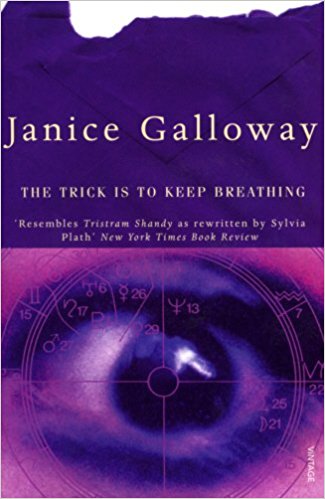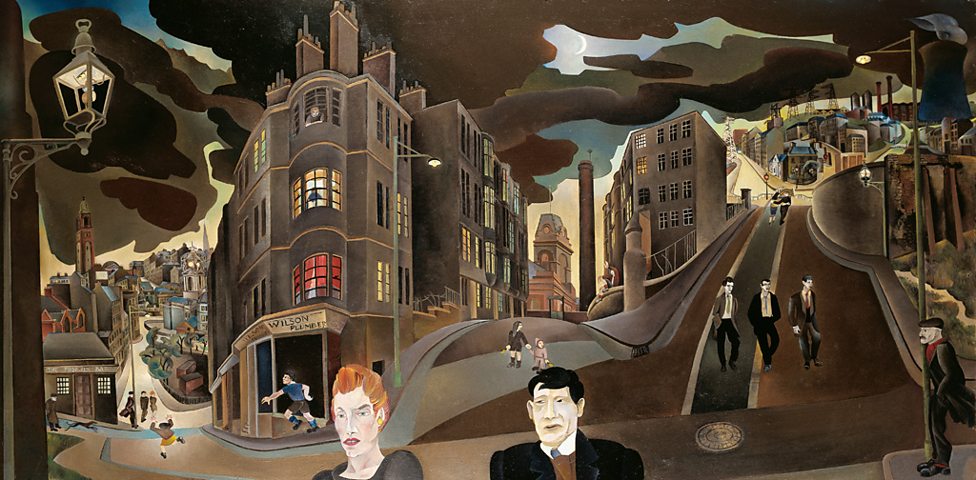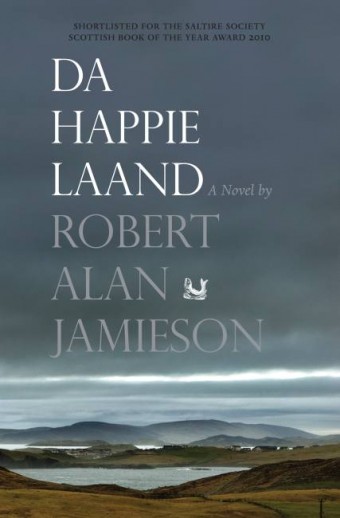Is there sic a hing as Scottish Leeteratur?
In Lanark Alasdair Gray scrievit:
“…think of Florence, Paris, London, New York. Nobody visiting them for the first time is a stranger because he’s already visited them in paintings, novels, history books and films. But if a city hasn’t been used by an artist not even the inhabitants live there imaginatively. […] Imaginatively Glasgow exists as a music-hall song and a few bad novels. That’s all we have given to the world outside. It’s all we’ve given to ourselves.”
Gin Gray wis richt when he pit doon his thochts on Glasgae’s imaginative existence, Ah’d say he’s richt nae langer. Ironically his ain wark has seen tae it that thae fowk that hae read Lanark hae graftit the atmosphere ontae their imaginitive sense o their kintrae.
Whaur he is spikkin truth is that leeteratur hus a muckle role tae pley in oor imagining o the warld aroon aboot us. But is there sic a hing as Scottish Leeteratur, an gin there is, whit like state is it in the day?
Owre aften when fowk hink o Scottish Leeteratur they hink o Burns. Nou am no sayin thare onything wrang wi Burns (aince ye forgit his chauvinistic inklins) but tae ainly focus on Burns ye dinnae aye see aw the braw modren leeteratur scrieved by Scots.
In the early twentieth century a muivement in Scottish leeteratur becam kent as the ‘Scottish Literary Renaissance’. This renaissance gied us a wheen o authors wha scrieved in Scots, or anent Scotland, an focht tae big up an identity through their airt. Lewis Grassic Gibbon, Jesse Kesson, Neil Gunn, Willa Muir, Nan Shepherd an Hugh MacDiarmid were the main bodies inveigled in the Renaissance. This can haurdly be cawed modern, but it gied modern scrievers a platform tae big anew oan.
 The devolution referendum in 1979 caused whit wis regairdit as yet anither, mair modren, renaissance in Scottish writin. That ettled tae cheenge an explore thochts roon Scottish nation an national identity, gien it a modren presence raither than a nostalgic, historical ane. This houiver disnae mean that a new Scottish national identity wis wrocht. The explorations o Scottish national identity makkit by scrievers o this renaissance war arguably pernicketie an tacht, mebbe in direct opposeetion tae auld kailyaird leeteratur that shawed a nostalgic bygane Scotland. The national identity gaun ower by Kelman, in How Late It Was, How Late, Alasdair Gray, in Lanark an Janine, an Janice Galloway in The Trick Is To Keep Breathing certaintly dinnae gie readers idealistic picturs, but hielichtit the problems an difficulties in Scotland, aw while yaisin Scots leid.
The devolution referendum in 1979 caused whit wis regairdit as yet anither, mair modren, renaissance in Scottish writin. That ettled tae cheenge an explore thochts roon Scottish nation an national identity, gien it a modren presence raither than a nostalgic, historical ane. This houiver disnae mean that a new Scottish national identity wis wrocht. The explorations o Scottish national identity makkit by scrievers o this renaissance war arguably pernicketie an tacht, mebbe in direct opposeetion tae auld kailyaird leeteratur that shawed a nostalgic bygane Scotland. The national identity gaun ower by Kelman, in How Late It Was, How Late, Alasdair Gray, in Lanark an Janine, an Janice Galloway in The Trick Is To Keep Breathing certaintly dinnae gie readers idealistic picturs, but hielichtit the problems an difficulties in Scotland, aw while yaisin Scots leid.
A guid place tae begin wae modren Scots leeteratur wad be Anne Donovan, her beuks Buddha Da an Gone Are The Leaves are great reads wi humorous an excitin stories. Gone Are The Leaves feels current as Donovan’s novelles explores Scottish connections tae Europe waein a meesterious tale. If science fiction is yer thing dinnae be hinkin that there’s naething fir ye! But n ben a-go-go by Matthew Fitt is a science fiction beuk kent fir bein scrieved aw in Scots, set in a futur Scotland owergang wi the difficulties o climate cheenge. There’s summit gey cheerie readin sentences sic as “Then the howff’s waws bloustered intae a cosmic stramash o a zillion pixels an a braid loch o lowin white licht kythed ablow his feet.”
Fir some leeterary fiction Da Happie Laand by Robert Alan Jamieson is dacent read, an a cuirious novelle that stents ower the genres fae mystery, tae history an emigration. Da Happie Laand leuks at Scottish empire an diaspora in new weys while askin whit it means tae belang in in twinty-first century Scotland. An Experiment in Compassion by Des Dillon meisurs the compassion ye hae as the reader, by makkin ye juidge the chairacters as Dillon shaws thair pasts.
Archie and The North Wind by Angus Peter Campbell is a beauty o a read that shaws the linguistic possibeelities o modren Scots leeteratur. Archie and The North Wind is a chairmin fable aboot leegends fae the Scottish islands, aften Gaelic fables, an the wey thir fables bide wi Archie aw his life, tae he at lang an last decidit tae fand the oreegin o the North Wind.
O coorse thir novelles are juist a pairt tae start on. There’s laids o contemporary Scots leeteratur oot thare waitin tae be read.
Ane wey tae finn oot whit is gaun on wi Scottish leeteratur the day is tae fare tae a festival. The tither weekend wis thrang wi festivals tae attend. Thare is a new festival aboot cawed ReimagiNation, it micht tak yer fancy, an it sounds like it will be braw an aw. ReimagiNation disnae juist focus on leeteratur it is aboot sharing mynds an stories in a common settin, fae book blethers, tae films, an fitbaw. The festival mynds the Scottish new touns creautit efter the Saicont Warld War. The first toun tae git a veesit fae ReimagiNation wis Cumbernauld the tither weekend. Thare war tons o events fir the wee anes tae git intae, like ‘Braw Wee Stories’ an Lego film makkin warkshoaps! Some of the tither guid soondin events wir a blether by Chris Lelslie and Johnny Rodger cawed ‘Disappearing Glasgow’ that wis aboot the toon’s cheengin architecture, the chance tae bigg yer awn Carbrain Totem wi Eilidh Muldoon, an poetry gaitherins wi the braw poet Liz Lochhead. It’s clear that Cumbernauld’s veesit fae ReimagiNation wis braw wi a wheen things tae dae. Nou dinnae wirry if ye misst it. ReimagiNation will veesit ither toons suin, wi laids o events fir free.
Events sic as thon are a braw wey tae reimagine yir ain toon, kintrae or warld through leeteratur an art.
Rachel Mackay graduatit wi a degree in leeteratur fae Aiberdeen University, an is daein a post-grad in contemporary fiction.
*
Don’t hate the media, become the media. Go here to support Bella Caledonia.



i’m a scots speaker. but no’ like this. naebody speaks like this. ‘leeterally’ ever. leeteratur. really. leeteratur.
Hiya Jock, Ah ken whaur yir comin fae.
Thon’s the issue we aa hae wi a sceivit Scots. We spikk at hame an wi pals an that, an whitivir we spikk we hink o as correct. We dinnae aye see the variations o The leid aa owre the kintrae.
Whin Scots is furthset, like the airticle abuin, wi spellins no sib tae wir ain pronunciation, It can feel faus or foreign.
Ah’d speir ye tae gie screivit Scots the same latitude ye gie English. It’s pit doon ae way, an pronounced whitiver way ye want it tae be.
Braw read – mony thanks!
Brilliant read Rachel! I really did understand every word. Many congratulations.
A haed a veesion; thon Holyrood Pairlament passt a Scots Language (Scotland) Act, an at lang an last gied aw Scots fowk equaliti wi Englis an Gaelic langage in oor ain kintra. Nae mair cultural doon hauden in oor ain laund!
Scottish literature certainly exists – in English, Gaelic and Scots – but it does so despite, not because of, articles like this.
Who, exactly, is behind this lunatic drive to encourage Scots speakers to write exactly as they like, with no respect for 800 years of Scottish literature, with no respect or even the slightest concession to our outstanding dictionaries, with absolutely no linguistic knowledge of the very subject they purport to promote? This article brings discredit to Scottish letters.
The word “hing” in Scots does not mean “thing”, an invention purely of the author’s who, like Matthew Fitt and God knows how many others, bases the spelling of words purely on phonetics and never on etymology, and seem to have a clear aversion to dictionaries.
These people are destroying Scots.
Here is the gist of the entry of the word “hing” from The Concise Scots Dictionary, which makes for a lot more interesting than this article written in creole English or pigeon Scots:
Hing (vt):
1) hang
2 hing to – attach or append (one’s seal to a document)
3) have the notice of one’s intention to marry displayed on a registrar’s notice board (chiefly in the passive)
4) to lean out of the window to watch events in the street below.
5) To delay, hover indecisively, to shirk.
6) To be in a poor state of health…
And the entry goes on and on and on…
Scots is a language which is hundreds of years old, with words which are rich and varied in nuance and meaning.
You can’t possibly expect anybody with a real interest in languages to accept a trade in of an 800 year old language, with all its richness, for the convenience of a phonetic spelling which leads to confusion and completely ignores the roots and the history of the language it presents itself to be.
Asturias, in the north of Spain, has a population of about one million people, and about 100,000 speak Asturian or Bable. They have had an Academy of Asturian for over a hundred years.
https://en.wikipedia.org/wiki/Academy_of_the_Asturian_Language
They have the same for Basque in the Basque Country, the same for Catalán in Catalonia, and the same for Gallego in Galicia.
Why can’t we have that in Scotland?
‘Matthew Fitt is destroying Scots.’ Right.
The road to hell is paved with good intentions, Bella…
If there is one thing in which Scotland is clearly revealed as a Philistine backwater beyond all hope or any redemption, it is in the thoroughly idiotic and harebrained attitude which prevails re its indigenous languages….
There are probably about 100 languages spoken in Europe today.
In only one of these, are its speakers encouraged to write it EXACTLY AS THEY PLEASE, on the grounds that to obligate them to LEARN the rules and spelling would be TOO TRAUMATIC FOR THEM TO BEAR…poor wee sauls….
Spot on Redgauntlet! This dae-it-yersel, mak-it-up-as-ye-gang ‘Scots’ is self-indulgent me-generation havers.
To be honest I’m considering just pulling the Scots content.
“Why can’t we have that in Scotland?”
Spot on RG. The Scottish Government’s ‘Minister for Learning, Science & Scotland’s Languages’ (aye, ‘Scotland’s Languages’!) and their boss Cabinet Secretary Angela Constance MSP shuid baith ‘hing’ thair heids in shame. Ten year in pouer an nae sicht nor waff o ony Scots Language Act.
Dinna pull the Scots language content Mike! Its important and Bella has carried some grand pieces, including this one. The debate ower the need fur a standard Scots orthography his riven the Scots Language movement since the days o the Scots Style Sheet proposed at the Makar’s Club meeting on April 11, 1947. It’s ey been characterised by flyting, which is a tradition ti be cherished. Ma faither, David Purves, warsled awa in the cause o a standard Scots for ower 30 year, servin as Preses o the Scots Leid Associe and Editor o Lallans, but makin sma progress. A share ma faither’s view that Scots will no be taken seriously as a modern European language till it has a standard form which can be taught in schools an uised as a reference point. That disna diminish the value o oor dialects or constrain creative innovation o the sort practiced by accomplished scrievers the likes o Mattew Fitt.
If onythin, things hae gone backwards in recent years, wi enthusiasts preferrin ti wallow in the comfort blanket o a Scots which is whitiver they want it ti be. In ma view, that sort o Scots isnae a language, it’s a personal plaikie. Language is for communication. We own it in common.
Whatever, Bella is providing a valuable service in providin space for Scots in aa its registers an lang may that continue. The debate ower the need fur a standard orthography gangs wi the territory. It has ey been and will ey be contermacious an carnaptious. Wear a stoot bunnet!
Here’s a link tae Mathew Fitt’s Grammar book. Duin wi the Scottish National Dictionary Association…
https://edinburghuniversitypress.com/book-grammar-broonie-pb.html
😉
Out of curiosity I investigated the word ‘scrieve’. All references describe it as archaic, and none of the native speakers I know are familiar with it. What’s the point of this?
No mention of “archaic” in this lengthy reference.
scrieve [skri:v]
n. A long or voluble story, a lengthy animated chat, a discourse, harangue, a long solo performance on a musical instrument. A piece of writing, a letter or its contents. A sharp-pointed tool for incising a mark on wood, the mark so made.
v. To move, glide, bowl swiftly along, to speed on smoothly. Of a fire: to flare up, to burn fiercely, to sweep onwards. To work vigorously. To talk fluently and at some length, to hold forth, to read quickly and continuously, to reel off a long story, to recite copiously. To write easily and copiously. To scratch or incise a mark such as the outline of some object on a piece of wood for cutting out.
pt. pp. scrieved
Hi, this is a great post. Thank you for sharing.